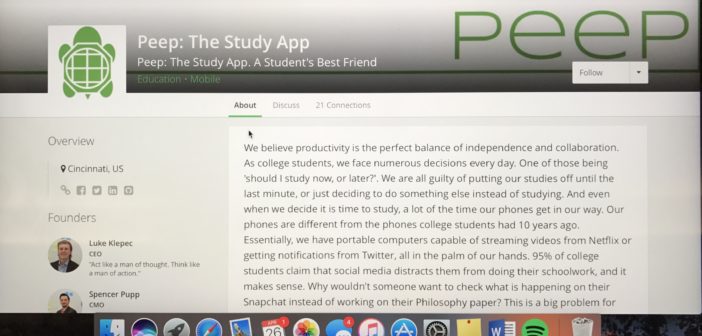Whether it’s a studying app or a relationship app, Peep: The Study App and Crushh are two new apps that will benefit college students. Peep, created by Luke Klepec of Xavier University, is a study app that will benefit stressed college students. Crushh, created by Es Lee of New York, analyzes someone’s interest in you via text.
Interview with Luke Klepec:
Interview with Es Lee:
EL: Crushh is an Android app that analyzes text messages and lets the user know how much the people they text like them… secretly. The app analyzes text messages (already on the phone, so there’s nothing to import) as well as call logs to arrive at a score indicating who likes who more, and other relative measurements. A user selects contacts on the phone and within seconds of hitting the button to analyze, the app comes back with a score rating the parity of the relationships on a five-point scale. A score of 5 means the contact likes the user much more and a 0 means the user likes the contact a lot more. A 2.5 means they like each other equally. The contact will never even know the user has analyzed their exchanges (thus the “shh” in Crushh).
MK: What inspired you to create this?
EL: The idea started from a conversation with a friend about dating in New York. He just moved to the city and was pretty confused by the texting game here. There was one girl he thought he clicked with but he was getting mixed signals in her texts. I looked through the text chain and could tell she liked him. I’d seen my share of confusing texting behavior here to start getting a good read on the “body language.” I figured whatever my thought process was could be converted into algorithms. So after many, many iterations, we think we have some pretty smart algorithms that can help the app think like a human does.
MK: What do you hope users get out of the experience of the app?
EL: I’m glad you asked this question. There may be a fair share of people who will use the app and think we’re just wrong (we’re far from perfect) or don’t want to see the truth about someone, especially if it’s someone they like. But our goal is mainly to reduce miscommunication, which is on the rise we rely more on texting in our relationships. We’re making a tool for people to better communicate and better understand how they may come across to other people. Sure, everyone wants a high score (meaning the other person likes you more) but the goal should be an equal relationship. If you really like someone and the app is showing a high score, it means you should try harder to reciprocate. We really just want to give people visibility on their relationships, so they can know where to focus their efforts. Over time, we hope to be making people better texters.

